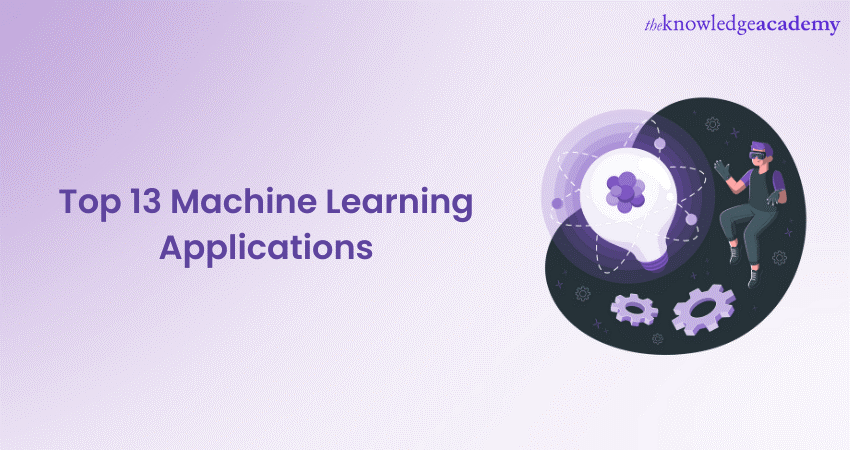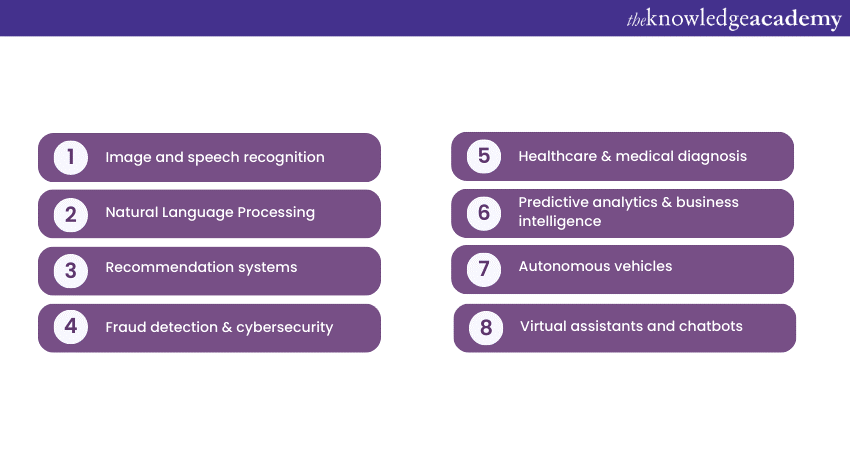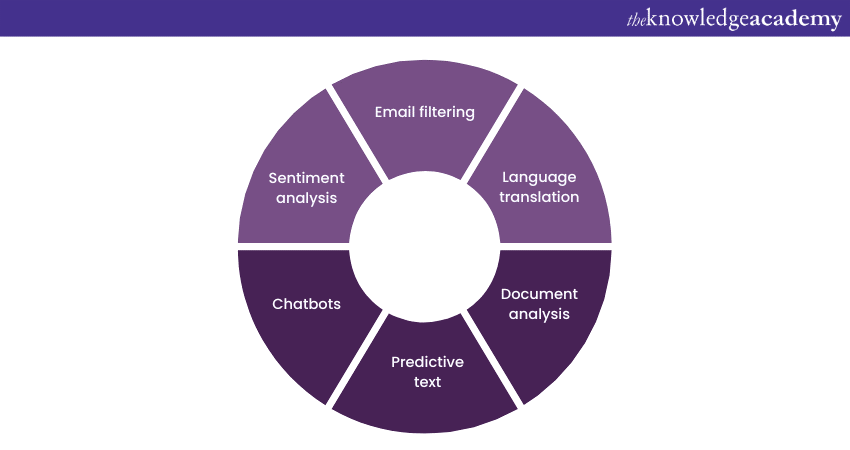We may not have the course you’re looking for. If you enquire or give us a call on +852 2592 5349 and speak to our training experts, we may still be able to help with your training requirements.
We ensure quality, budget-alignment, and timely delivery by our expert instructors.

Machine Learning Applications have emerged as transformative technologies within Artificial Intelligence (AI), enabling computers to learn and improve from experience without explicit programming. This field empowers machines to recognise patterns, make data-driven predictions, and solve complex problems with unparalleled accuracy and efficiency.
Machine Learning (ML) has revolutionised industries, reshaping how we interact with technology. If you wish to learn various Applications of Machine Learning, such image, speech recognition, personalised recommendations and fraud detection, this blog is just for you. Explore this blog learn to about Machine Learning Applications and their use cases that have significantly impacted industries and daily life.
Table of Contents
1) What are the Applications of Machine Learning?
a) Image and speech recognition
b) Natural Language Processing (NLP)
c) Recommendation systems
d) Fraud detection and cybersecurity
e) Healthcare and medical diagnosis
f) Predictive analytics and business intelligence
g) Autonomous vehicles
h) Virtual assistants and chatbots
i) Financial trading and stock market analysis
j) Drug discovery and pharmaceutical research
k) Social media analysis
l) Energy and resource management
m) Weather forecasting
2) Conclusion
What are the Applications of Machine Learning?
Machine Learning has found widespread applications across various industries, revolutionising the way businesses operate and empowering researchers to solve complex problems:

Image and speech recognition
Machine Learning, particularly Deep Learning models, has revolutionised image and speech recognition. Image recognition algorithms can accurately identify objects, faces, and scenes in images with remarkable precision. These applications have numerous uses in various industries, from medical imaging to autonomous vehicles, where the ability to recognise and interpret the surroundings is essential for safe and efficient operations.
Similarly, speech recognition technology, powered by Machine Learning, has advanced significantly, enabling virtual assistants like Siri, Alexa, and Google Assistant to transcribe spoken language into text. As a result, it has facilitated Natural Language Interactions with users. Image and speech recognition applications have far-reaching implications, including medical diagnostics, surveillance systems, and voice-controlled user interfaces.
In healthcare, Machine Learning-powered image recognition systems aid in the early detection of diseases like cancer by analysing medical images with unparalleled accuracy. In the automotive industry, autonomous vehicles leverage Machine Learning for object detection, enabling them to navigate through complex environments and avoid collisions.
Natural Language Processing (NLP)
Natural Language Processing (NLP) is one of the essential Machine Learning Applications that empowers computers to understand and interpret human language. NLP algorithms analyse and extract meaning from vast amounts of textual data, enabling a wide range of applications across diverse industries.

Sentiment analysis, a common NLP application, helps businesses gauge customer satisfaction and public opinion based on textual feedback from social media, reviews, or surveys. This valuable insight allows companies to respond to customer needs effectively and improve their products and services.
Language translation systems, another NLP application, have transformed global communication, bridging language barriers and facilitating interactions between people from different linguistic backgrounds.
Moreover, chatbots and virtual assistants leverage NLP algorithms to engage in natural, human-like conversations with users. These AI-powered assistants can answer questions, provide information, and perform tasks. This, as a result, enhances user experience and streamlines customer support processes.
Explore the possibilities of AI with our Artificial Intelligence & Machine Learning Course!
Recommendation systems
One of the Machine Learning Applications includes algorithms that drive personalised recommendation systems. These systems have become ubiquitous in e-commerce, media, and entertainment platforms. They analyse vast amounts of user data to provide tailored suggestions, enhancing user engagement and increasing customer satisfaction.
Collaborative filtering and content-based filtering are two techniques usually used in recommendation systems. The former relies on user behaviour and preferences to identify users with similar tastes and recommend items that similar users have enjoyed. The latter, on the other hand, uses item attributes to make recommendations that match the user's previous choices.
In e-commerce, recommendation systems entice users to discover and purchase products based on their browsing and buying history. These systems not only improve user experience but also drive sales and customer loyalty. In media and entertainment, recommendation engines personalise content delivery, suggesting movies, TV shows, or music based on users' viewing or listening history.
Fraud detection and cybersecurity
Machine Learning plays a pivotal role in fraud detection and cybersecurity. Anomaly detection algorithms analyse historical transaction data to identify suspicious activities and potential fraud attempts in financial transactions.
By detecting deviations from normal patterns, these systems can prevent financial losses and protect sensitive information. ML-based intrusion detection systems recognise abnormal patterns in network traffic. As a result, they safeguard computer systems from cyber threats and ensure data security.
Healthcare and medical diagnosis
In the healthcare industry, Machine Learning is transforming medical diagnosis and treatment. ML models analyse medical data, including patient records and medical images, to assist in diagnosing diseases and predicting patient outcomes. By identifying patterns and trends in patient data, Machine Learning aids in personalised treatment recommendations, leading to improved patient care and outcomes.
Try our Machine Learning Training and unleash the possibilities of Artificial Intelligence!
Predictive analytics and business intelligence
Machine Learning enables businesses to harness the power of data for predictive analytics and business intelligence. Predictive analytics leverages historical data and ML models to forecast future trends and demands. As a result, it helps optimise inventory management, production schedules, and resource allocation.
Business intelligence applications provide valuable insights into customer behaviour, market trends, and business performance. They also support data-driven decision-making for improved efficiency and profitability.
Autonomous vehicles
Machine Learning is a cornerstone of autonomous vehicles, allowing them to navigate and make decisions without human intervention. ML algorithms process data from various sensors, such as cameras, radar and LiDAR, to detect objects, interpret road conditions, and make real-time driving decisions. The integration of Machine Learning in autonomous vehicles is transforming transportation, promising safer roads and more efficient mobility solutions.
Virtual assistants and chatbots
Virtual assistants and chatbots rely on Machine Learning, particularly NLP, to understand and respond to user queries. These applications engage in natural, human-like conversations with users. They provide relevant information and offer personalised services. Virtual assistants like Siri, Alexa, and Google Assistant have become an integral part of our daily lives, assisting with tasks, answering questions, and managing smart devices.
Financial trading and stock market analysis
Machine Learning has revolutionised financial trading and stock market analysis. ML algorithms analyse financial data and historical stock prices to predict stock market movements and make informed investment decisions. These models can identify patterns and trends in market data, enabling traders to capitalise on profitable opportunities and manage risks effectively.
Try our Deep Learning Training to learn the capabilities of Machine Learning!
Drug discovery and pharmaceutical research
In the pharmaceutical industry, Machine Learning Applications are visible in the development of new therapies. Machine Learning models analyse chemical structures and molecular interactions to predict the effectiveness and safety of potential drug candidates. This allows researchers to prioritise promising compounds and reduce the time and cost of drug development.
In silico drug discovery, also known as virtual screening, uses Machine Learning to simulate and analyse drug-target interactions. By simulating molecular interactions in a virtual environment, researchers can identify potential drug candidates that may bind to specific target molecules and modulate disease pathways.
Moreover, Machine Learning models can analyse patient data and genetic information to identify patient subgroups that may respond better for specific treatments. This fosters the development of personalised medicine approaches, modifying treatments to individual patients based on their genetic profiles and disease characteristics.
Social media analysis
Machine Learning techniques are widely employed in social media analysis to understand customer sentiment, track brand reputation, and identify emerging trends. Sentiment analysis algorithms process social media data, reviews, and comments to gauge public opinion about products, services, or events. Businesses use this valuable insight to understand customer satisfaction, identify areas for improvement, and respond to customer feedback effectively.
Social media listening tools, powered by Machine Learning, track mentions, hashtags, and trends to monitor brand reputation and assess the effectiveness of marketing campaigns. This real-time monitoring enables companies to respond to crises promptly and engage with customers in a timely manner. ML models also enable personalised content recommendations on social media platforms, ensuring users receive content that aligns with their interests and preferences. This enhances user engagement, increases the time spent on the platform, and fosters user loyalty.
Social media analysis is invaluable for market research and competitive intelligence. ML algorithms can identify popular trends, emerging topics, and influencers, allowing businesses to stay ahead of the competition and adapt their marketing strategies accordingly. Moreover, these models can detect and filter out fake news, misinformation, and spam on social media, improving the overall quality of information shared on these platforms.
Try our Neural Networks with Deep Learning Training and become a catalyst of change in the technological world!
Energy and resource management
Machine Learning is applied in energy management to optimise power consumption, reduce energy wastage, and improve efficiency. Smart grids equipped with ML algorithms analyse data from sensors and smart meters to predict energy demand accurately. By forecasting peak demand periods, smart grids can optimise energy distribution and reduce electricity costs.
Machine Learning also aids in load forecasting, where models analyse historical data to predict future energy consumption patterns. These forecasts help energy providers plan for peak demand periods and allocate resources more efficiently.
Moreover, ML algorithms can optimise energy consumption in buildings, homes, and industrial processes. By analysing data from smart thermostats and Internet of Things (IoT) devices, these algorithms adjust energy usage to minimise waste and reduce carbon emissions.
In renewable energy, Machine Learning is used to predict energy production from solar panels and wind turbines. By understanding weather patterns and environmental conditions, renewable energy sources can be integrated more effectively into the grid. Machine Learning Applications in energy and resource management contribute to environmental sustainability by promoting energy efficiency, reducing greenhouse gas emissions, and enabling a more resilient and reliable energy grid.
Weather forecasting
Machine Learning techniques are employed in weather forecasting to analyse historical weather data and predict future weather patterns accurately. These ML models leverage various data sources, including satellite imagery, atmospheric data, and historical weather patterns, to enhance the reliability and accuracy of weather predictions. Accurate weather forecasting has far-reaching implications, from disaster preparedness to agricultural planning, benefiting various sectors and ensuring public safety.

Conclusion
The widespread adoption of Machine Learning across various domains has ushered in a new era of innovation and efficiency. Its transformative capabilities in image and speech recognition, healthcare, finance, and more have revolutionised industries and improved lives. As technology continues to advance, the continued exploration and refinement of Machine Learning Applications holds the promise of even greater possibilities in the future.
Gain a deep understanding of programming languages and Ai. Join our Natural Language Processing (NLP) Fundamentals with Python Course today!
Frequently Asked Questions
Upcoming Data, Analytics & AI Resources Batches & Dates
Date
 Introduction to AI Course
Introduction to AI Course
Fri 17th Jan 2025
Fri 7th Mar 2025
Fri 23rd May 2025
Fri 18th Jul 2025
Fri 12th Sep 2025
Fri 12th Dec 2025







 Top Rated Course
Top Rated Course


 If you wish to make any changes to your course, please
If you wish to make any changes to your course, please


